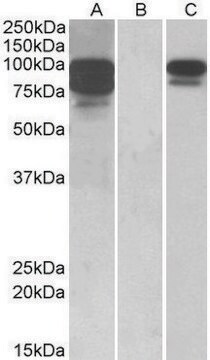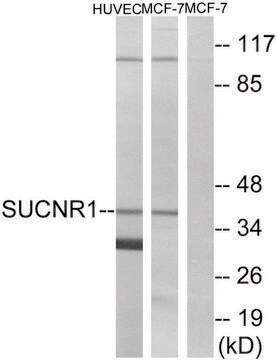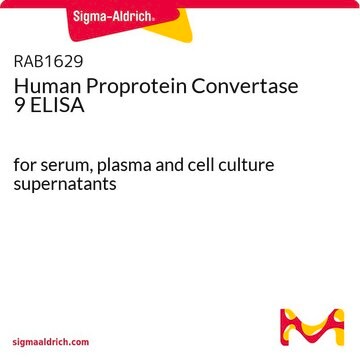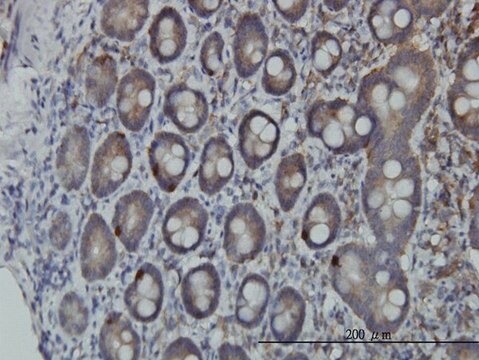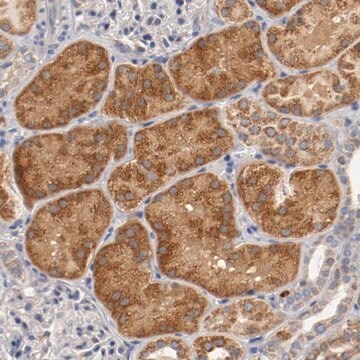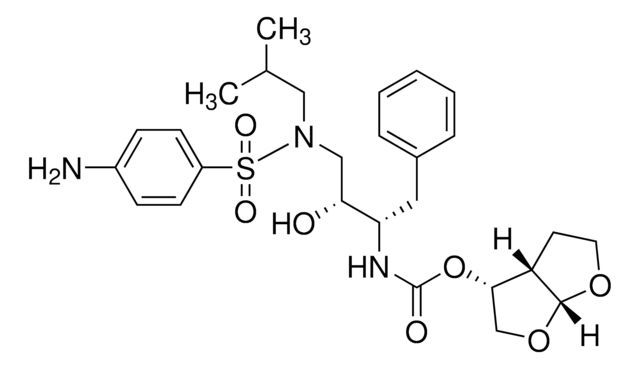ABS1006
Anti-PCSK9 Antibody
from rabbit, purified by affinity chromatography
別名:
NARC-1, PC9, Subtilisin/kexin-like protease PC9, Proprotein convertase 9, Neural apoptosis-regulated convertase 1, Proprotein convertase subtilisin/kexin type 9
ログイン組織・契約価格を表示する
すべての画像(2)
About This Item
UNSPSCコード:
12352203
eCl@ss:
32160702
NACRES:
NA.41
おすすめの製品
由来生物
rabbit
品質水準
抗体製品の状態
affinity isolated antibody
抗体製品タイプ
primary antibodies
クローン
polyclonal
精製方法
affinity chromatography
化学種の反応性
human
テクニック
immunocytochemistry: suitable
western blot: suitable
NCBIアクセッション番号
UniProtアクセッション番号
輸送温度
wet ice
ターゲットの翻訳後修飾
unmodified
遺伝子情報
human ... PCSK9(255738)
詳細
PCSK9 protein is an important protein in the regulation of plasma cholesterol homeostasis. PCSK9 binds various lipid receptor protein members including low density lipoprotein receptors (LDLR), very low density lipoprotein receptor (VLDLR), apolipoprotein E receptor (LRP1/APOER) and apolipoprotein receptor 2 (LRP8/APOER2) and promotes their degradation or sequestration. In neurons, PCSK9 regulates neuronal apoptosis via modulation of LRP8/APOER2 levels and related anti-apoptotic signaling pathways. PCSK9 is localized in cytoplasm but it is also secreted and thus can be found in endosomes, lysosomes, and endoplasmic reticulum and Golgi as well. PCSK9 is expressed in normal cells such as Schwann cells and pancreatic epithelial cells but PCSK9 is also expressed in many cancers and cancer cells lines as well.
免疫原
His-tagged recombinant protein corresponding to Human PCSK9.
アプリケーション
Research Category
細胞シグナル伝達
代謝
細胞シグナル伝達
代謝
Research Sub Category
脂質シグナル伝達
肝生理学
脂質シグナル伝達
肝生理学
This Anti-PCSK9 Antibody is validated for use in Western Blotting and Immunocytochemistry for the detection of PCSK9.
Western Blotting Analysis: A representative lot of this antibody detected PCSK9 protein in treated HepG2 cell lysate (Jeong, H. J., et al. J. Lipid Res. 2008. 49: 399–409.)
Western Blotting Analysis: A representative lot of this antibody detected PCSK9 protein in siRNA transfected HepG2 cells without and with BBR treatment (Data compliments of Sahng Wook Park of Yongsei University College of Medicine).
Western Blotting Analysis: A representative lot of this antibody detected PCSK9 protein in siRNA transfected HepG2 cells without and with BBR treatment (Data compliments of Sahng Wook Park of Yongsei University College of Medicine).
品質
Evaluated by Immunocytochemistry on HepG2 cells
Immunocytochemistry Analysis: 8.0 µg/mL of this antibody detected PCSK9 in HepG2 cells.
Immunocytochemistry Analysis: 8.0 µg/mL of this antibody detected PCSK9 in HepG2 cells.
ターゲットの説明
~75 kDa observed
物理的形状
Antigen Affinity Purified
Purified rabbit polyclonal in buffer containing PBS with 0.05% sodium azide with 30% glycerol.
保管および安定性
Stable for 1 year at -20°C from date of receipt.
Handling Recommendations: Upon receipt and prior to removing the cap, centrifuge the vial and gently mix the solution. Aliquot into microcentrifuge tubes and store at -20°C. Avoid repeated freeze/thaw cycles, which may damage IgG and affect product performance.
Note: Variability in freezer temperatures below -20°C may cause glycerol containing solutions to become frozen during storage.
Handling Recommendations: Upon receipt and prior to removing the cap, centrifuge the vial and gently mix the solution. Aliquot into microcentrifuge tubes and store at -20°C. Avoid repeated freeze/thaw cycles, which may damage IgG and affect product performance.
Note: Variability in freezer temperatures below -20°C may cause glycerol containing solutions to become frozen during storage.
その他情報
Concentration: Please refer to lot specific datasheet.
免責事項
Unless otherwise stated in our catalog or other company documentation accompanying the product(s), our products are intended for research use only and are not to be used for any other purpose, which includes but is not limited to, unauthorized commercial uses, in vitro diagnostic uses, ex vivo or in vivo therapeutic uses or any type of consumption or application to humans or animals.
適切な製品が見つかりませんか。
製品選択ツール.をお試しください
保管分類コード
10 - Combustible liquids
WGK
WGK 2
適用法令
試験研究用途を考慮した関連法令を主に挙げております。化学物質以外については、一部の情報のみ提供しています。 製品を安全かつ合法的に使用することは、使用者の義務です。最新情報により修正される場合があります。WEBの反映には時間を要することがあるため、適宜SDSをご参照ください。
Jan Code
ABS1006:
試験成績書(COA)
製品のロット番号・バッチ番号を入力して、試験成績書(COA) を検索できます。ロット番号・バッチ番号は、製品ラベルに「Lot」または「Batch」に続いて記載されています。
Jessica M Cale et al.
Scientific reports, 13(1), 19725-19725 (2023-11-14)
Splice modulating antisense oligomers (AOs) are increasingly used to modulate RNA processing. While most are investigated for their use as therapeutics, AOs can also be used for basic research. This study examined their use to investigate internally and terminally truncated
ライフサイエンス、有機合成、材料科学、クロマトグラフィー、分析など、あらゆる分野の研究に経験のあるメンバーがおります。.
製品に関するお問い合わせはこちら(テクニカルサービス)![[KD Validated]Anti-PCSK9 Antibody, clone 9L4U5, Rabbit Monoclonal](/deepweb/assets/sigmaaldrich/product/images/287/260/cdc087a1-d8df-45f5-b520-65479f938aa1/640/cdc087a1-d8df-45f5-b520-65479f938aa1.jpg)
